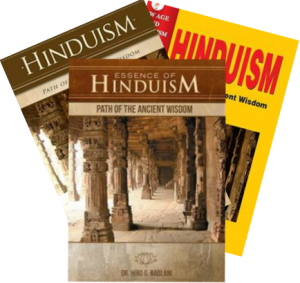In most places, the meaning in English is described where any Sanskrit word is used in the book for the first time. Some particularly important words appear here for immediate reference.
Abhay: Fearlessness
Abhyasa: Practice
Abhisheka: Ritual bathing of the deity’s image
Acharya: Spiritual preceptor
Advaitya: Non-duality or monoism
Agamas: Scriptures of rituals and temple construction
Agni: Hindu god of fire
Ahimsa: Non-injury or nonviolence, in thought, word, or deed
Akasa: Free open space, sky, ether
Amrita: Nectar of immortality
Ananda: Divine bliss
Anekta: Different points of view
Antahkaran: Inner being
Apara: Imperfect
Archana: Personalized temple worship
Artha: Property, wealth
Asana: Body posture
Ashrama: Place for learning, hermitage
Asura: Evil spirit, demon
Atman: Soul
Aum or Om: mystic symbol (icon) of the Divine
Avtara: Incarnation of God in earthly form
Ayurveda: Ancient Hindu science of life
Bhakti: Devotion of God
Brahmacharya: Divine conduct, controlling lust when unmarried
Brahman: Supreme Being, Transcendental Absolute
Brahmand: Represents solar system or galaxy in Hindu scriptures
Brahmin: Person with divine knowledge, used as higher caste
Buddhi: The determinative faculty of mind
Chakra: Subtle center of consciousness at different levels
Chit: Consciousness
Dasanami: Ten renunciate orders founded by Sri Shankaracharya
Daya: Compassion
Deva: Shining One, refers to God or deity
Devi: Goddess, Shakti deity
Dharma: What sustains, way of righteousness, religion
Dhyana: Concentration, meditation
Dipavali: Row of lights, Hindu festival to celebrate the return of Lord
Rama from exile
Ganges: India’s most sacred river
Grihastha ashrama: Householder law and family code of conduct
Guna: Strand, quality (inherent from birth)
Guru: One who removes darkness of ignorance, spiritual preceptor
Hatha-Yoga: A school of yoga that chiefly aims at physical well-being
and exercises
Ida: Feminine psychic current flowing along the Kundalini energy
Ishta Deva: Chosen family or personal deity
Japa: Recitation of Lord’s name
Jnana: spiritual knowledge or wisdom
Kalpa: Time period in Hindu scriptures
Karma: Action, deed, in Hindu philosophy it refers to the consequences
of the deeds performed
Kartikeya: Son of Lord Shiva, also known as Skanda, Murgan,
Subramanya
Kriya: Religious rite or ceremony
Kundalini: Coiled latent cosmic serpent power, awakened with yoga
practice
Mahaprasthna: Great departure, death
Mahatma: Great, enlightened soul
Mahayuga: Time period in Hindu scriptures
Mantra: Mystic sound syllable endowed with spiritual energy, Vedic hymn
Mauna: Vow of silence
Maya: Illusion, God’s ever-changing manifestations of the creation
Moksha: Salvation, in Hindu philosophy liberation from recurrent birth/death cycles
Murti: Image, icon, or effigy of God
Nirguna: (God) Without attributes and form
Nirvana: Absorption in the Absolute Transcendental, liberation
Nirvikalpa samadhi: The realization of Self, a state of oneness with Supreme
Ota-prota: pervading in all the creation
Papa: Wickedness or sin
Para: Perfect
Paramhansa: Highly evolved soul
Pingala: Masculine psychic current flowing along the kundalini
energy
Prakruti: Primordial nature, the material substratum of the creation
Prana: Vital energy, life principle, also refers to breath
Pranayama: Breath control by yoga technique
Prayaschitta: Penance, acts of atonement for mitigating the effects of
karma
Puja: Worship and adoration ceremony
Pujari: Hindu temple priest, anyone who performs the worship
rituals
Punarjanma: Reincarnation, taking birth again and again
Punya Bhumi: Holy land
Punya: Virtuous, auspicious actions
Purana: Ancient lore of Hindu folk narratives
Rajsic: Active, materialistic
Rishi: Enlightened soul with spiritual wisdom
Rita/Ruta: Hindu god of order
Sadhana: Religious or spiritual discipline and meditation toward super conscious God-realizationSadhu: Holy man, Hindu monk
Saguna: (God) With attributes and form
Sahan-Shakti: Tolerance
Samadhi: Ecstasy, communion with God
Sampardaya: Sect
Samsara: The phenomenal world fraught with recurrent birth and death cycles
Samskara: Hindu sacraments and rites marking significant stages of life, creating mental impression
Sanatana Dharma: Eternal religion of Hindu philosophy
Sanyasa: Renunciation, refers to those who have renounced household aspirations and obligations
Sanyasin: One who has renounced, Hindu monk, swami
Sanskrit: The classical language of sacred Hindu scriptures
Sanstha: Organization
Saraswati: Goddess of arts and learning, sacred river of ancient Hindu civilization
Satguru: Spiritual preceptor of highest attainment
Sattvic:Noble auspicious
Satya: Truth
Self: Refers to the Supreme Being at the core of every soul
Self Realization: Direct knowing of the Supreme God, the ultimate spiritual experience
Seva: Service, selfless work considered an integral part of spiritual path
Shanti: Peace
Shastra: Scripture
Shraddha: Faith and reverence
Siddha: A perfected one, who attains supernatural powers
Sloka: Holy hymn in Hindu scripture
Sumati: Good auspicious mind
Swadharma: One’s own set of duties
Swami: Hindu monk, who knows spiritual knowledge, one who is master of one’s senses
Swastika: Hindu sign of auspiciousness
Tamsic: Indolent, lethargic
Tapas: Austerities and penances associated with spiritual purification
Tilaka: Marks made on forehead with red clay, ash or sandalwood.
Varna: Group, caste in Hindu society
Vasudev Kutumbkam: God’s universal family
Vastu Shastra: Hindu scripture dealing with building construction
Veda: Literally means (spiritual) knowledge or wisdom. Hinduism’s most authentic scripture
Vedanta: Final culmination of the Vedas, refers to the ultimate wisdom and spiritual knowledge
Yajna: Worship sacrifice, offerings in sacred fire altar agni havan-kund
Yama-niyama: Hinduism’s fundamental ethical codes
Yoga: Union with the Divine




